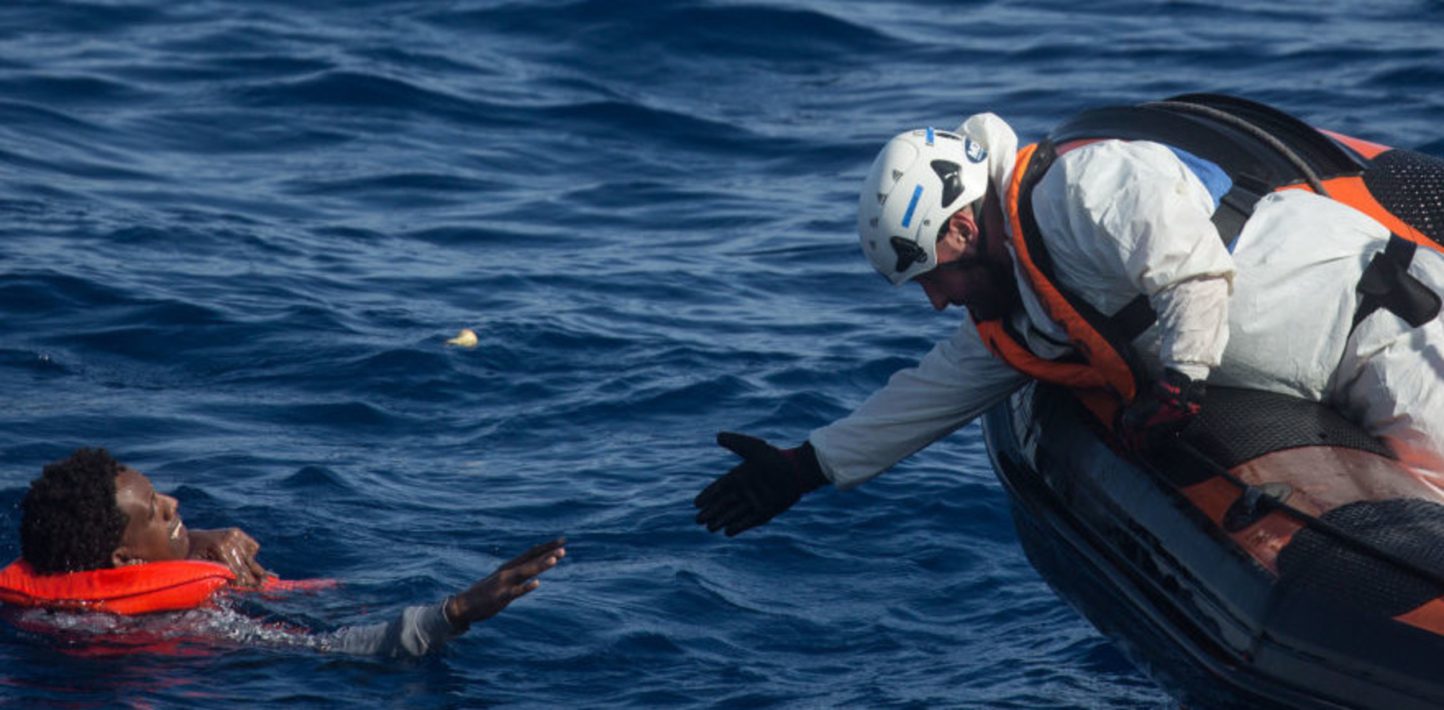European leaders must urgently act to fix a system which deters states from assisting refugees and migrants in peril at sea, said Amnesty International in an analysis published today.
Cut adrift in the Mediterranean outlines how the outsourcing of European border control to the Libyan authorities, in combination with a system which fails to share responsibility for asylum-seekers fairly across Europe, has created a situation where people are frequently stranded in the Mediterranean. It also sets out steps to ensure situations like the stranding of the Sea-Watch and Sea-Eye rescue ships, and the blocking of Proactiva Open Arms, do not happen again.
Leaders must fix a broken system which is failing both frontline EU states and people seeking safety who are left abandoned at sea or languishing in EU countries with inefficient asylum procedures
Matteo de Bellis, Amnesty International
“The shameful spectacle of rescue ships being blocked and women, men and children stranded at sea for weeks on end whilst politicians compete to be the most callous in refusing to let them disembark or access any assistance, should never be repeated,” said Matteo de Bellis, Amnesty International’s Migration Researcher.
“Leaders must urgently take steps to fix a broken system which is failing both frontline EU states and people seeking safety who are left abandoned at sea or languishing in EU countries with inefficient or overburdened asylum procedures.”
The absence of Europe-wide mechanisms to share the responsibility to assist newly arriving asylum-seekers has significant implications for frontline states responsible for examining asylum claims, hosting applicants, integrating those recognized to be in need of international protection and returning those who are refused protection to their countries.
The strategy focuses on keeping people away from Europe despite the fact that Libya does not have the capacity to coordinate rescues and that people rescued cannot be taken there due to the risk of torture, extortion and rape
Matteo de Bellis, Amnesty International
EU governments have put in place a series of measures to block crossings in the central Mediterranean, including by boosting the capacity of the Libyan Coast Guard to intercept people seeking safety and hampering the work of NGOs carrying out search and rescue operations.
This strategy has focused on keeping people away from Europe despite the fact that Libya does not have the capacity to coordinate rescues and that under international law people rescued at sea cannot be taken to a country, such as Libya, where they are exposed to torture, extortion and rape.
In order to reduce the number of people being disembarked in their ports, some EU countries have withdrawn or reduced patrols by their own navies. NGOs that have stepped in to fill the gap have found themselves regularly refused a port at which to dock, particularly in Italy and Malta. Some European governments have even prevented them from conducting their life-saving activities, through unfounded criminal investigations and bureaucratic obstacles.
The latest such example is the order issued by Spanish maritime authorities last week, preventing Proactiva Open Arms from rescuing people in the central Mediterranean. In the administrative order, the Spanish authorities acknowledge the failures of the system, highlighting how Mediterranean states have acted in breach of international maritime law and standards, but make rescuers and asylum-seekers pay the price for that failure.
There is still a window of opportunity to reform the current asylum system or temporarily fix its shortcomings before the European elections in May
Matteo de Bellis, Amnesty International
“Proposals to reform the current system or temporarily fix its shortcomings have been paralyzed by some governments, but there is still a window of opportunity before the European elections in May,” said Matteo de Bellis.
“European leaders can no longer turn their backs on people stranded at sea and continue distorting the debate on migration for their own political gain. They must urgently agree on a swift and predictable disembarkation policy in line with international law and on a fair system to share responsibility for asylum-seekers among EU countries.”
BACKGROUND
On Monday 14 January it emerged that Spanish authorities had prevented the Proactiva Open Arms from setting sail for the Central Mediterranean.
Last week, 49 people were finally disembarked in Malta after 19 days at sea aboard the Sea-Watch 3 and Sea-Eye’s Professor Albrecht Penck NGO rescue ships.
Prompt disembarkation is discouraged by the unfairness of European asylum rules (the so-called Dublin system). These determine the country responsible for examining an asylum application.
Usually the country through which the asylum-seeker first entered the EU is considered responsible for examining their asylum claim, hosting them during the process, integrating the successful applicants and returning those who are refused protection to their countries.
In 2017, the European Parliament proposed a radical change to the Dublin regulation, which would introduce a binding mechanism to ensure that all EU countries receive their fair share of people fleeing violence and persecution. However, the European Council has failed to reach agreement on a reform of the Dublin system, due to opposition from some European countries to take responsibility for any asylum-seekers.
See our 2018 report here.


